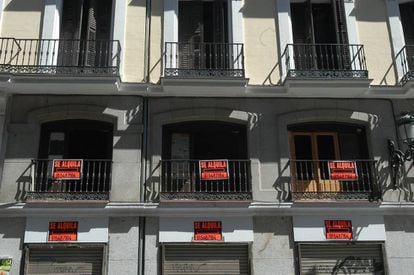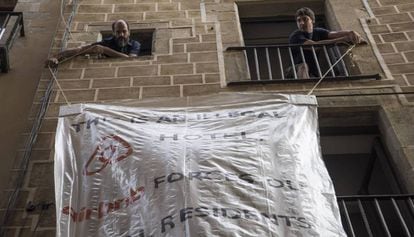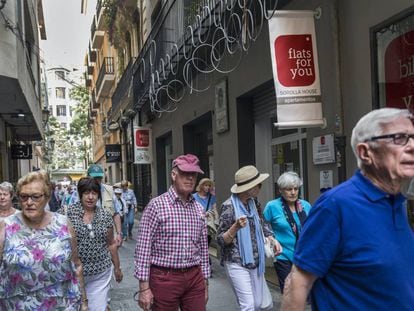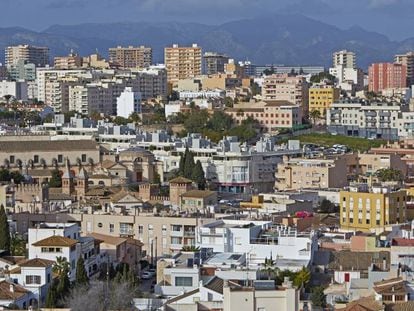Local authorities act to curb holiday rentals in Spain
Councils attempt to fill the legal vacuum that is pushing rent up and permanent residents out of city centers

The tourism boom and the sharing economy have created an explosive cocktail in Spain’s real estate market. Holiday rentals have become a lucrative business that is proliferating in the centers of the most popular cities, steadily pushing out the permanent residents.
Renting a home in the downtown area of some of Spain’s main cities now costs between 10% and 15% more than it did just a year ago, according to the popular real estate website Idealista. And online platforms like Airbnb, Homeaway or Booking are helping attract demand and raise prices.
Now, local governments are stepping in with a series of measures aimed at regulating the sector and containing these soaring prices. Ultimately, the goal is to prevent city centers from becoming tourist theme parks where the locals cannot afford to live.
MADRID. On Thursday of last week, local authorities approved a special plan regulating tourist accommodation. The plan will not go into effect until early next year, but it reflects many of the proposals made earlier by the government of Mayor Manuela Carmena. These include forcing holiday rentals in the area comprised within the M-30 ring road (referred to as the “central almond” of Madrid) to have their own independent building entrance, as use of the residents’ entrance will be banned. This measure would affect 95% of existing holiday rentals in downtown Madrid, according to official city estimates. The plan also considers that a housing unit that is rented out to tourists for more than 90 days out of the year is being used for commercial activity, and its owner will have to apply for a commercial license.

With these measures, city officials are hoping to curb gentrification in downtown Madrid, where 500 proceedings have been launched against the owners of housing units in the districts of Centro, Salamanca, Moncloa and Chamberí. Of these, 147 have ended with owners forced to stop using their properties as holiday rentals, said officials, noting that there are an estimated 8,000 such housing units in the Spanish capital.
BARCELONA. Ada Colau became the mayor of Barcelona after being a high-profile housing activist with a group called Platform of Mortgage Victims (PAH). Colau ran on a platform that promised to make housing a priority of the local government. But despite a stream of pioneering measures, evictions continue to take place and the rental bubble, partly fueled by pressure from tourism, has proven intractable. This inability to keep her promises has drawn criticism from the opposition.
Even before Colau’s election, Barcelona had already stopped granting licenses for holiday rental homes. The illegal market, however, is a thriving business. The city has managed to shut down nearly 2,400 unlicensed tourist apartments and forced online sites like Airbnb to pull many of its ads for unlicensed apartments. The Special Plan for Tourist Accommodation is pushing hotels to the outskirts, and banning the use of residential buildings for visitor accommodation.

In recent months, Colau has focused her efforts on seeking international alliances with cities such as London, New York and Paris, where rental prices are also spinning out of control. Colau is asking the central government in Madrid to reform legislation to make rental leases longer and put a cap on price hikes.
At the local level, the last two measures to be enacted involve fines for landlords who deliberately harass their tenants to force them out in order to later rent out the place for a much higher price. Another initiative will force private developers to set aside 30% of new housing units for affordable housing.
VALENCIA. The regional government has given itself a new tourism law that only makes provisions for new holiday rental units if owners can produce a compatibility report that is issued by local governments. This effectively leaves regulation in the hands of local councils. In the city of Valencia, where there are an estimated 5,000 tourist apartments, the city must certify that the property is located on the ground floor or one of the lower floors of the building; any other applications will be rejected.

SEVILLE. Statistics compiled to June of this year show there are 3,969 licensed tourist apartments in the Andalusian capital, although the total, counting unlicensed units, could be close to 8,000 according to city estimates. “Seville does not have a problem of the same scope as Barcelona,” says tourism councilor Antonio Muñoz, who talks about the need for citizen awareness to tackle the issue. “For the last five years we have had a forum to address the fight against unlawful holiday rentals, as well as a regional decree regulating the industry. But we need to take more steps to ensure the problem does not grow.” The city of Seville is also working on an amendment to zoning laws and a new ordinance.
PALMA DE MALLORCA. This week, the city of Palma approved the final draft of regulations affecting holiday rentals on the island capital. Under these rules, tourist apartments are banned throughout the city except in single-family homes in specific areas. Soaring prices and lack of clear rules led the regional government of the Balearic Islands to pass a law in August of last year leaving it up to each island to allow holiday rentals or not.
IBIZA. On the island of Ibiza, the rising cost of rent is particularly egregious. The lack of affordable housing is keeping away necessary professionals, including doctors, teachers and police officers who say they cannot afford to live there. Local authorities have so far been unable to approve their own zoning map, although to all effects and purposes holiday rentals are banned on the island following the enactment of regional legislation.
Luca Constantini, Cristina Vázquez, Lucía Bohórquez, Clara Blanchar and Ángeles Lucas contributed reporting to this story.
English version by Susana Urra.
More information












































